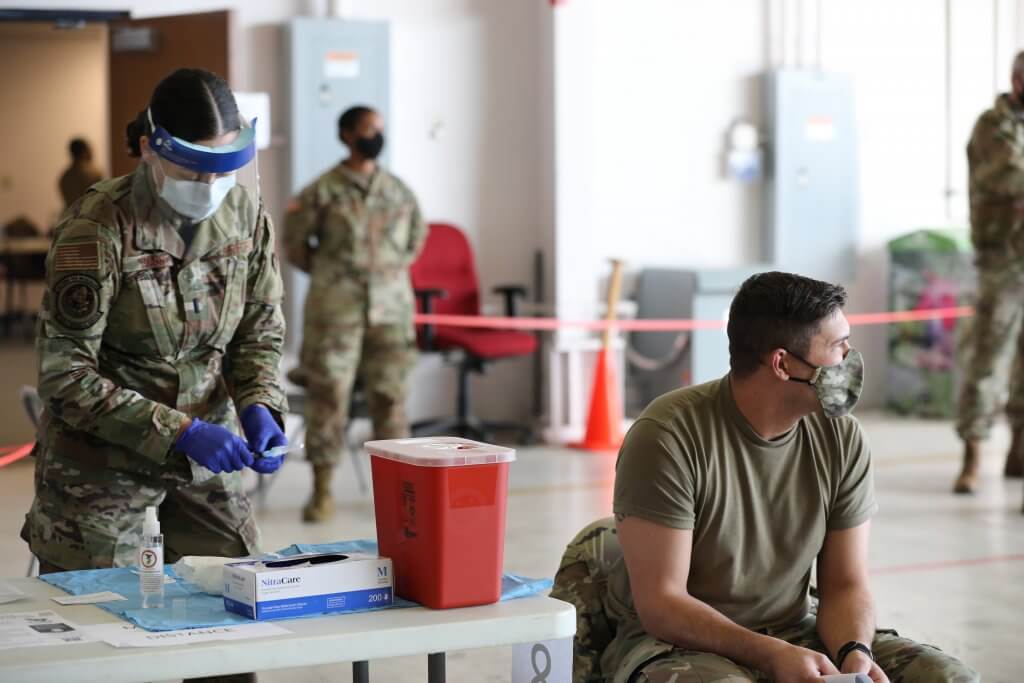Editor’s note: This article was originally published June 28 and updated July 8.
New data shows that 87% of Army National Guard members and 89% of Army Reserve members were fully vaccinated against COVID-19 following a June 30 deadline.
The Army released the updated statistics on Friday, July 8. Previous data, current as of June 21, showed that tens of thousands of the approximately 337,000 guardsmen face possible expulsion from service.
“Army readiness is dependent on soldiers who are prepared to train, deploy, fight and win our nation’s wars,” wrote an Army spokesman in an email. “Unvaccinated soldiers affect the readiness of our formations.”
The deadline also applied to the Army Reserve, which alongside the Army Guard, had later deadlines than other branches. The July 8 data shows that 90% of Army reservists had completed at least one dose of a COVID-19 vaccine regimen.
“Soldiers and airmen are still providing civilian documentation to be entered into their Electronic Health Record, so the numbers may be higher than what we are currently seeing in the military system,” Wayne V. Hall, a National Guard Bureau spokesman said in an email ahead of the June 30 deadline.
Sleeves up for COVID-19 vaccination
Since Secretary of Defense Lloyd Austin III issued a COVID-19 vaccine mandate in August 2021, officials have disseminated corresponding education to Guard and reserve units. While Hall cannot speak for the Army Reserve, he wrote that guardsmen could attend “Shot Expos” and other educational events to learn about the Pfizer, Moderna and Johnson & Johnson shots.
“The National Guard, across all 50 states, three territories and the District of Columbia have all taken a variety of steps to help their soldiers and airmen understand the reasons for the vaccination requirement and have provided medical personnel to educate them on [vaccine] safety and effectiveness,” he said. “Our senior medical officials here say that one of the most important things they do is just answering soldiers’ questions about the vaccine and what it will do to provide for their safety and wellness.”
Air Force Reserve Master Sgt. Charles McCarter received the Johnson & Johnson inoculation in March after his religious exemption and appeal were both denied.
“A doctor on base told me the vaccine was safe for me,” McCarter said. “I took it to keep my job and support my family; that’s it.”
He said minor shoulder pain was his only known side effect.
Guardsmen have been eligible for vaccination for several months, and among the early adopters was Maj. Jessica Camacho Blas, deputy J3 for the Guam National Guard COVID-19 Joint Task Force 671. She received her first dose of the Moderna vaccine on Jan. 8, 2021.
“I’m getting vaccinated because I want to be part of the solution,” she wrote.
And as recently as last week, the Guam National Guard was commended for its COVID-19 response, which included holding town halls about the vaccines, providing informational materials and working on campaigns with the public health agency and governor’s office. However, the most important aspect might have been conversations between service members and families, according to Guam National Guard Capt. Mark Scott.
“If there is room for open and respectful dialogue, and we remind each other that we are selfless servants with a duty to uphold, the choice to get vaccinated may have a better chance of coming from within,” he said via email, noting they expect to see a 98% to 99% vaccination rate.
Stateside, Navy Reserve Petty Officer 1st Class Jess Kolbeck, said he’s the only executive in his civilian job who has not been vaccinated against the virus.
The sailor of nearly 19 years filed for a religious exemption in November 2021 and then an appeal when it came back denied. That appeal denial reached him in June. Kolbeck has not been allowed to attend drill since February and recently received paperwork warning of potential administrative separation for his absences.
“I don’t know what they’re doing with me yet,” he said.
Holding pattern
Kolbeck is not alone in wondering about his future. At least 7,000 National Guardsmen have applied for exemptions from the vaccine, nearly all religious in nature.
Hall said that the Headquarters Department of the Army has not yet provided guidance to the National Guard concerning COVID-19 vaccine refusers beyond the Army’s June 30 deadline.
“The goal here is about ensuring the health and the care of our soldiers, our airmen and their families,” he wrote. “Administratively, no Department of Defense funding may be allocated for payment to service members for duties performed under Title 32 for members of the National Guard who do not comply with DOD COVID-19 vaccination requirements, and no credit or excused absence shall be afforded to members who do not participate in drills, training or other duty due to failure to be fully vaccinated.”
No Army guardsmen have been separated for refusing the vaccine as of press time, and statistics for individual reserve branches are not always available. As of May 9, at least 57 Air Reserve and Air National Guardsmen were moved to the Individual Ready Reserve roster, according to Headquarters Air Force. And as of June 22, Navy leaders have given 209 reserve sailors their separation orders.
“This vaccination effort is about taking care of our people and ensuring their readiness to respond when needed,” Hall wrote.

